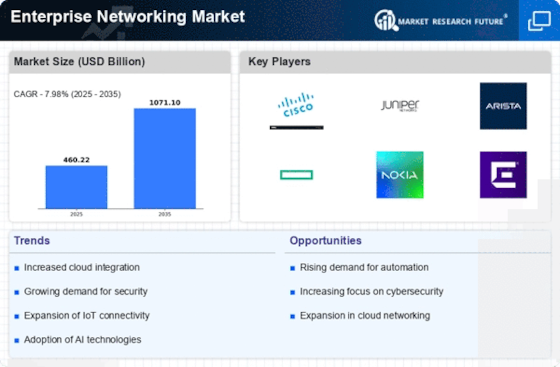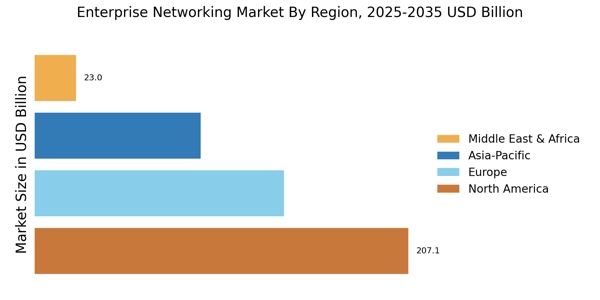Emergence of 5G Technology
The rollout of 5G technology is poised to revolutionize the Enterprise Networking Market. With its promise of ultra-fast data speeds and low latency, 5G enables organizations to enhance their networking capabilities and support bandwidth-intensive applications. Current projections indicate that 5G adoption could lead to a 50% increase in data traffic within enterprise networks by 2026. This surge in demand for high-speed connectivity is prompting businesses to reevaluate their networking strategies and invest in infrastructure that can accommodate 5G technology. As enterprises seek to harness the potential of 5G, the Enterprise Networking Market is likely to experience substantial growth, driven by the need for advanced networking solutions that can support next-generation applications.
Integration of Internet of Things (IoT)
The proliferation of Internet of Things (IoT) devices is significantly influencing the Enterprise Networking Market. As organizations deploy an increasing number of connected devices, the demand for scalable and efficient networking solutions has surged. Current estimates suggest that the number of IoT devices could reach 30 billion by 2025, necessitating robust networking infrastructures capable of handling vast amounts of data traffic. This trend compels enterprises to invest in advanced networking technologies that can support IoT applications, such as edge computing and low-latency connectivity. Consequently, the integration of IoT into enterprise networks is likely to drive innovation and growth within the Enterprise Networking Market, as businesses seek to leverage the benefits of connected technologies.
Rising Demand for Remote Work Solutions
The shift towards remote work has catalyzed a notable transformation in the Enterprise Networking Market. Organizations are increasingly investing in robust networking solutions to support remote employees, ensuring seamless connectivity and collaboration. According to recent data, the demand for virtual private networks (VPNs) and secure access service edge (SASE) solutions has surged, with projections indicating a growth rate of approximately 20% annually. This trend underscores the necessity for enterprises to adopt scalable networking infrastructures that can accommodate fluctuating workforce dynamics. As businesses continue to embrace hybrid work models, the Enterprise Networking Market is likely to witness sustained growth driven by the need for reliable and secure remote access solutions.
Increased Investment in Network Security
As cyber threats become more sophisticated, the emphasis on network security within the Enterprise Networking Market has intensified. Organizations are allocating substantial budgets to fortify their network defenses, with a reported increase of 15% in cybersecurity spending over the past year. This investment encompasses advanced firewalls, intrusion detection systems, and comprehensive security information and event management (SIEM) solutions. The growing awareness of potential vulnerabilities has prompted enterprises to prioritize security in their networking strategies, thereby driving demand for integrated security solutions. Consequently, the Enterprise Networking Market is evolving to incorporate security as a fundamental component of network architecture, ensuring that organizations can safeguard their data and maintain operational integrity.
Adoption of Software-Defined Networking (SDN)
The transition towards Software-Defined Networking (SDN) is reshaping the landscape of the Enterprise Networking Market. SDN offers enhanced flexibility and control over network resources, allowing organizations to dynamically allocate bandwidth and optimize performance. Recent studies indicate that the SDN market is expected to grow at a compound annual growth rate (CAGR) of 25% over the next five years. This growth is driven by the increasing need for agile networking solutions that can adapt to changing business requirements. As enterprises seek to streamline operations and reduce costs, the adoption of SDN is likely to accelerate, positioning it as a key driver in the evolution of the Enterprise Networking Market.


















Leave a Comment